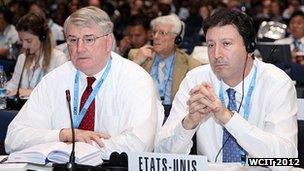Divisions over internet governance intensify in Dubai
- Published

Regulators have been given a fortnight in Dubai to reach consensus over the regulations
Rival visions over governance of the internet have emerged at a UN conference in Dubai.
Russia, the UAE and others are proposing that 193 countries have "equal rights to manage the internet" including its technical specifications.
They want this stated in an international communications treaty.
By contrast, the US wants to limit how the net features in the treaty's regulations.
It says that failure to do so could aid censorship, adding that its view is backed by many countries in Europe, Latin America and the Asia-Pacific.
Leaked document
Tensions between the views of the US and Russia were widely reported ahead of the start of the World Conference on International Telecommunications (Wcit) last Monday - but it was not known if Moscow's stance would be supported by others.
This changed after a document including a section dedicated to the internet was passed to the conference's organiser, the UN's International Telecommunication Union (ITU), on Friday.
It will be discussed by other attendees this week.
Although not formally made public, a draft was published over the weekend by Wcitleaks - a website dedicated to leaked documents relating to the conference.
The 22-page document says it was drawn up by Russia, the United Arab Emirates, Saudi Arabia, Algeria and Sudan.
Egypt's name was also attached, however on Sunday the country issued a statement, external saying it did not support the proposals.
Equal rights
Under a section titled "Internet" the document says that governance should be the shared responsibility of "governments, the private sector and civil society", external.
It adds that member states should have equal right to manage "internet numbering, naming, addressing and identification resources".
This would mark a shift from the current system in which the US Department of Commerce decides who runs the Internet Assigned Numbers Authority (Iana) - the body responsible for regulating the net's address system.
The DoC recently renewed a contract for the independent, California-based organisation Icann to do so.
The US's control over Iana is a legacy of its funding for Arpanet - a precursor to the internet which helped form its technical core.

The US wants to minimise mention of the internet in the communications treaty
Some see this as an anachronism, but the US says it is defending a system in which a range of multi-stakeholder organisations with technical expertise can make "agile, rapid-fire decisions", regarding the development of the internet.
It suggests the internet's health would be threatened if development of its technical foundations were passed onto civil servants, the ITU or some other body.
Disputed definitions
The US is also engaged in a wider battle over whether the treaty's scope should extend beyond big telecom companies - such as BT, Telefonica and AT&T - to any relevant "operating agency".
There has been speculation that use of this phrase could legitimise government interference into the operations of smaller internet service providers (ISPs) and cloud-based operations such as Google or Facebook.
"It creates an open door for review of content and potential censorship there, it will create a chilling environment for the internet," said Terry Kramer, the US's ambassador to Wcit, in a video uploaded, external by the ITU on Sunday.
Mr Kramer is pushing for the more specific term "recognised operating agencies" to be used instead. However, other countries are concerned this could restrict their ability to co-ordinate responses to problems such as spam and cyber attacks.
Deadline approaches
In the ITU's video Mr Kramer concludes that compromise might be impossible.
"Right now it feels like we are at an impasse because there are philosophical differences," he said.
The ITU itself has pledged not to put disputed issued to a majority vote, leaving it just four working days to try to find a common text all sides can agree on.
Failure to do so could see some of the treaty's regulations left unamended from the last time they were reviewed - a quarter of a century ago when the internet was not a concern.
The BBC has requested an interview with the Russian delegation but has been told it cannot grant interviews at this point.
- Published6 December 2012
- Published4 December 2012
- Published22 November 2012